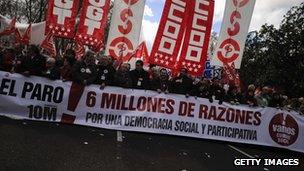Spain's jobless rate falls for first time in two years
- Published

Unemployment has caused discontent among Spanish unions
Spain's unemployment rate has fallen for the first time in two years, according to official figures.
The rate stood at 26.3% in the second quarter of the year, down from a record 27.2% in the first quarter.
A strong tourist season was credited with boosting employment. Tourism accounts for about 10% of Spanish GDP.
The news came a day after the Spanish central bank forecast that the economy will return to growth before the end of the year.
It estimated the economy shrank again in the last quarter, but by only 0.1%.
Spain has been hit by a double-dip recession since the collapse of the property market during the financial crisis in 2008.
The Spanish government of Prime Minister Mariano Rajoy says it also expects the recession to end soon.
Long-term problem
It has cited improving export figures as evidence that Spain can trade its way out of the downturn.
But the country is still implementing austerity measures required by an EU-IMF bailout agreement, and the banking sector is still undergoing restructuring.
Meanwhile, state-backed lender Bankia reported a return to profit in the first half of the year after racking up huge losses in 2012.
It made 200m euros (£173m) in the first six months of the year.
Unemployment remains the biggest economic concern, however.
Spain's National Statistics Institute said the total number of unemployed has now fallen to just below six million.
It described the fall in unemployment as "the biggest since 2008".
But the unemployment rate of 26.3% comes only second to Greece as the highest in the EU.
Youth unemployment also remains extremely, high, with more than 56% of Spain's 15-24 year olds out of work.
Some economists question whether seasonal factors such as tourism can have a significant impact on unemployment, which they say is becoming a long-term problem.
Around half of those unemployed have been out of work for more than one year, and there are now 1.8 million households where none of the occupants are in work.
- Published2 July 2013
- Published19 June 2013
- Published2 May 2013